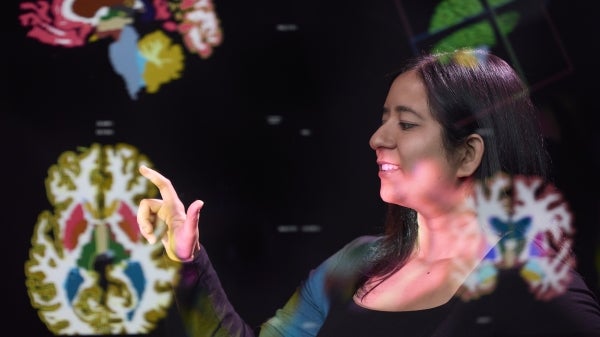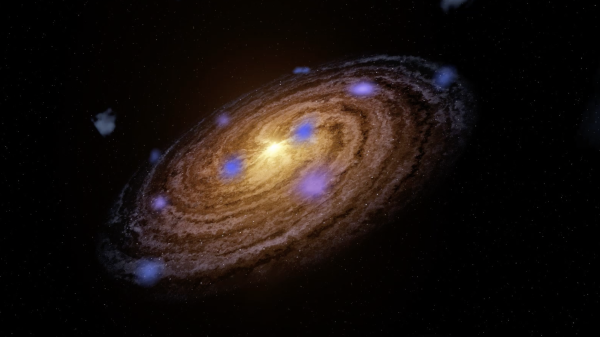Making a difference one student at a time

ASU School of Life Sciences adviser Ivy Esquibel received a prestigious award for her outstanding career. Her passion is connecting with her students and seeing them succeed in every aspect of life. Photo courtesy Ivy Esquibel
The National Academic Advising Association has awarded Ivy Esquibel with its prestigious Outstanding Adviser Award in the Primary Role category. Esquibel is the second School of Life Sciences’ adviser to win the award.
During her academic experience, Esquibel remembers struggling to understand the higher education system without an adviser and only a checklist in hand.
“My experience going back to school was terrifying,” Esquibel said.
Driven by her own experiences as a nontraditional student and her passion for people and connection, Esquibel jumped into advising and knew she had found her calling.
“Working with a diverse student population at Mesa Community College really changed the way I perceived the world and realized the opportunity I had to make a difference,” she said.
Esquibel currently works at Arizona State University in the School of Life Sciences as an academic adviser to online students and as an internship coordinator. One aspect of her job consists of helping students find resources within ASU and making connections with potential employers, research labs and other faculty.
Esquibel often works closely with nontraditional students coming to university life from a variety of backgrounds and with a unique set of needs and characteristics. Throughout her career, she has worked with students experiencing mental health issues, homeless students, single mothers and many others.
“They all have a story, they all have goals, and most important, they all have dreams,” Esquibel said.
As part of the award’s application process, Esquibel described her advising philosophy as the "starfish" philosophy, based on a story written by Loren Eiseley:
“One morning after a big storm, a little girl had hurried down to the beach where the tide was out, and the whole beach was full of starfish, and she was walking along, picking each one up and gently tossing it back into the water. She didn’t notice a person passing by that was staring curiously at her and finally, the person asks, 'What are you doing?' And she said, 'The storm washed all of these beautiful starfish up onto this beach, and when the sun is high in the sky, they will suffer. I am helping them back into the water because they cannot help themselves.' The person answered, 'Oh, there are too many of them, you will never make a difference.' She picked up the next one, tossed it back into the sea and said, 'I made a difference to that one.'"
“I am committed to using all my skills, knowledge and energy to make a difference to the student that is in front of me right now, in the present moment,” Esquibel said.
Helping students to graduate is key, but her primary goal has been to increase opportunities for experiential learning. Experiential learning includes getting involved in research, internships, volunteering, community service and studying abroad.
“Students need a broader perspective to understand that people think differently, to have more compassion and empathy with each other. Not just to graduate with a diploma, but to graduate with experiences and skills that will set them apart,” Esquibel said.
Her biggest achievement has been helping students overcome great obstacles and finding success, whatever that means for them. Touching the lives of so many students that come from so many different backgrounds, and seeing them succeed has been the most rewarding aspect of the job for Esquibel.
“Watching their lives change as a result of things they previously lacked the courage or confidence to attempt … this thrills me and gives me a great sense of satisfaction,” she said.
What this award means to Esquibel is all the overwhelming support from students, faculty and colleagues: “Every single one of my colleagues wrote a letter of recommendation for me; to hear academics whom I admire was overwhelming,” she said, but more importantly, “this award is validation that I am doing what I should be doing, that I am making a difference, one starfish at a time."
More Science and technology

New NIH-funded program will train ASU students for the future of AI-powered medicine
The medical sector is increasingly exploring the use of artificial intelligence, or AI, to make health care more affordable and…

Cosmic clues: Metal-poor regions unveil potential method for galaxy growth
For decades, astronomers have analyzed data from space and ground telescopes to learn more about galaxies in the universe.…

Indigenous geneticists build unprecedented research community at ASU
When Krystal Tsosie (Diné) was an undergraduate at Arizona State University, there were no Indigenous faculty she could look to…